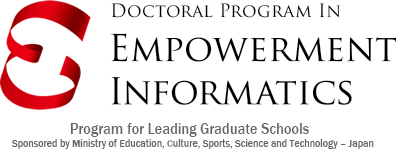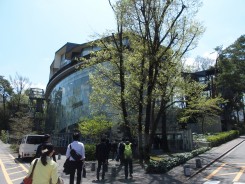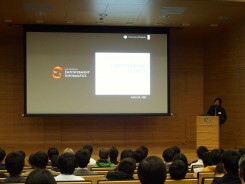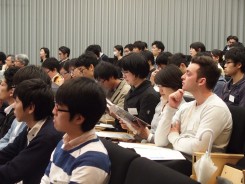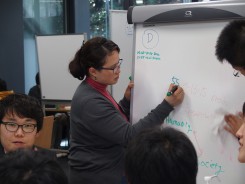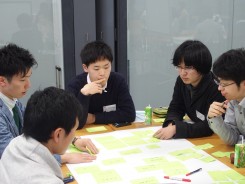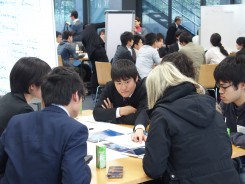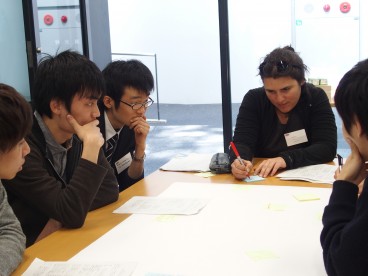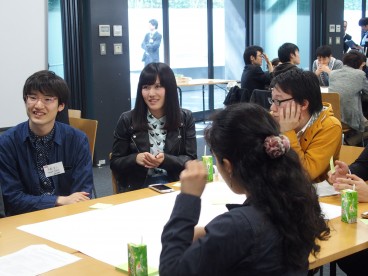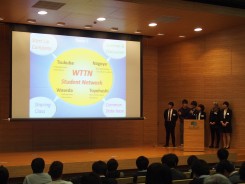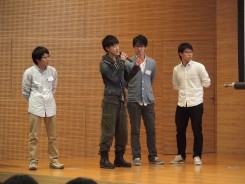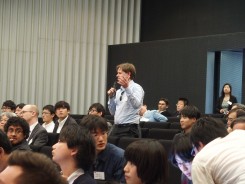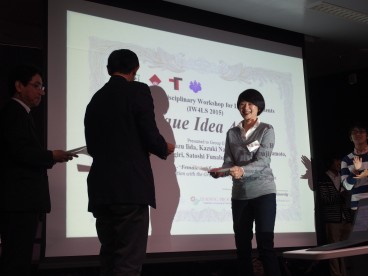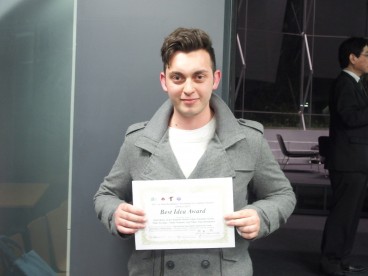Report on participation in the Interdisciplinary Workshop for Leading Students 2015 (IW4LS2015)
Fifteen new EMP students participated in the Interdisciplinary Workshop for Leading Students 2015 (IW4LS2015) held Saturday, April 11, 2015 at Nagoya University. Intended to enhance future cooperation and foster student exchange in leading interdisciplinary research in informatics, this workshop welcomed about 100 students and faculty members from four leading programs: Waseda University’s Graduate Program for Embodiment Informatics, the Toyohashi University of Technology’s Doctoral Degree Program for Training Brain Information Architects, the University of Tsukuba’s Ph.D. Program in Empowerment Informatics, and Nagoya University’s Graduate Program for Real-World Data Circulation Leaders. Participants introduced their leading programs to each other and discussed prospects for future cooperation.
The workshop began with introductions to the leading programs by each of their program coordinators: Prof. Shigeki Sugano (Waseda University), Prof. Shigeki Nakauchi (Toyohashi University of Technology), Prof. Kazuya Takeda (Nagoya University), and Associate Prof. Kenji Suzuki (University of Tsukuba, representing the Program Coordinator). After that, participating students split into nine teams for discussions and group work on the topic “Collaboration with the Graduate Program for Real-World Data Circulation Leaders, Nagoya University.” Lastly, each team of students announced its ideas, and participants voted to decide the winners of the Best Idea Award and the Unique Idea Award. From the Program, first-year student Karlos Ishac won the Best Idea Award and third-year student Naomi Kuramoto won the Unique Idea Award.
The workshop in Nagoya was a great opportunity to collaborate with Japan’s leading University’s in the Robotics, Neuroscience and Data Circulation fields. It gave me the chance to network with fellow students in the same research field as myself and whom shared similar interests. As well as this, I had the privilege of meeting students from other research areas which I was also interested in. This provided me with a good basis for discussing potential interdisciplinary research ideas and network with other like minded students. The competition on the day saw us test our research, technical and creative abilities by being randomly put into a group and given 2 hours to design and present a system for improving data circulation between our Universities and research labs. It was an enjoyable and challenging contest and it was also very interesting to see the systems presented by the other groups. Overall I greatly enjoyed the workshop and felt like it was an informative experience and an excellent opportunity to harness and expand my technical and entrepreneurial abilities.
In this workshop we planned collaboration among the four universities utilizing Nagoya University leading program’s theme of data circulation. Our group started by naming as many domestic and international problems as we could and sorting them by theme, such as energy, education, or the aging of society. Thinking that the issues of the aging of society and education might be closely related, after considering solutions we proposed a system for measuring life logs of people’s lives and using the results of analysis to propose better ways of life to the next generations. In the presentations, we were able to gain a wide range of knowledge through numerous discussions on how to communicate in appealing ways information such as overviews of systems, the roles of individual universities, and topics involved in making these ideas reality.
The presentations made by students of the same generation were highly stimulating, not only because of the students’ abilities to express themselves in English but also thanks to the rich content of questions asked, which provided the opportunity to hear views from a variety of perspectives. Through this workshop, I was reminded anew of the current level of my own abilities and specific issues to address in the future.
This was a very meaningful workshop in that we were able to learn about overviews of the interdisciplinary leading programs in informatics at each of the universities and to think about the possibilities for future inter-university cooperation. In particular, I think that the group discussions among students from all of the universities provided a valuable opportunity to deepen our understandings of the nature of the facilities at each university and think in practical terms about the roles of each and methods of cooperation in implementing future joint projects. In making a presentation on our project idea, my team employed efforts including incorporating a short skit to make clear the issues in the background and to attract the attention of other participants. While it lasted just a short time, I feel that sharing knowledge in this way and working together to build a single project was a very meaningful experience. Above all, the opportunity to get to know students at other leading programs through this workshop was a once-in-a-lifetime experience.
Interdisciplinary Workshop for Leading Students 2015 was an interesting opportunity to meet up with students from other Universities in Japan, with similar fields of research; especially for us, foreign Empowerment Informatics students, who were not familiar with other Japanese Universities programs and academic research activities. From the Universities representatives talks and slides we have learned a lot about their programs and research achievements. During the workshop session I received some even more detailed information regarding their study approach and curriculums directly from students. We compared our laboratory research topics and talked about future collaboration with regards to our program possibilities and achievements. During the brainstorming session on solving our task within the proposed new collaborative system among our departments it was interesting to hear and learn other students visions of solving and presenting the idea. To make a project proposal in such a short time was a challenging task for us. Of course it was a good test for us to see how flexible and operational we are in the collaborative work with totally new people from different countries.
Nagoya Interdisciplinary workshop was also a good opportunity to visit Nagoya University where their representatives showed us their facilities and presented to us some of their projects developments.
In my opinion this kind of collaborative interdisciplinary workshops among different universities are important for getting to know and share each other’s knowledge and experience. I believe that communication among students from different universities is fundamental for any further collaboration regarding education, research or joint projects.
Team discussions
Presentations
Unique Idea Award winner Kuramoto and Best Idea Award winner Ishac


